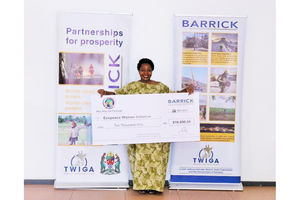Bunge committees reveal the rot in gemstone mining

What you need to know:
- The chairman of the diamond committee Mr Mussa Azzan Zungu was the first to present findings of their investigations and said the government did not have its own statistics on the diamond reserve in the country and depended only on miners’ statistics
Two parliamentary committees formed by the National Assembly Speaker Job Ndugai to investigate tanzanite and diamond mining have revealed the rot that, according to them, cost the country billions of shillings. The teams that focused on mining, contracts, ownership and management of both tanzanite and diamond also accused some government officials of signing dubious contracts that did not benefit the country from the gemstone mining.
The chairman of the diamond committee Mr Mussa Azzan Zungu was the first to present findings of their investigations and said the government did not have its own statistics on the diamond reserve in the country and depended only on miners’ statistics.
It’s estimated that the area has 40.4 million carat of diamond, but Mr Zungu said this was according to the reports of the mining company - Williamson Diamond Limited. “This is where they have been hitting us hard,” he said. Williamson Diamond Limited (WDL) reported losses between 2007 and 2017 and therefore could not pay corporate tax. Instead, the company paid alternative mineral tax worth Sh1.96 billion.
“At the same time, the company’s mining licence stays until 2033…why didn’t they close the mine if they were continuously recording losses?” he queried.
Mr Zungu also expressed the committee’s disappointment in the variation of statistics provided by the miners and different government institutions on the diamond mining, export and even the royalty paid to the government. For instance, while the Ministry of Energy and Minerals reported that Tanzania exported diamond valued at $362.1 million between 2007 and 2016, the Tanzania Minerals Audit Agency (TMAA) said it was $374.6 million. The ministry also said $18 million was paid as royalty while TMAA indicated that it was $15 million. Both are government institutions.
He also provided statistics that showed differences between those provided by TMAA and Tanzania Revenue Authority (TRA). The team also showed doubt in the control of diamond mining as government agencies including security organs did not have access to some important mining areas.
He said only miners have access to a special room, which also has an exit that the committee suspected was used to smuggle diamond and therefore deny government revenue.
The committee said refining of diamond is done twice – in the country and final refining is done in Belgium – but the government only monitors the local oxidation.
“As the diamond is refined in the second time outside the country, it becomes clearer, more valuable and therefore attracts good price,” he said.
The team mentioned Prof Abdulkarim Mruma who signed a document that he did not read. “Prof Mruma said he was so busy that he could not read it and trusted those who drafted the document,” said Mr Zungu.
He also accused Deputy Works, Transport and Communications Mr Edwin Ngonyani who was then working in the ministry of misleading the government by advising it not to buy Petra Energy and therefore deny government $342 million which the company recorded as profits between 2009 and 2016.
The team revealed that WDL has a debt of $238 million the company borrowed from banks using the mine as loan security. However, the debt is not verified by the Bank of Tanzania.
Mr Zungu said the remaining diamond is estimated at Sh80.8 trillion and the government should review the contract to ensure the money benefits the country.
The team recommended the government to claims 50 per cent shareholding in the diamond mine and make sure it takes serious actions against individuals who were involved in dubious contracts.
Mr Zungu said Tanzania should do away with royalty system.
Tanzanite investigations
On the other hand, the team that investigated tanzanite mining said the contract between Tanzania’s mining corporation (Stamico) and the Tanzanite One Mining Ltd has no benefits other than causing a loss estimated at Sh157 billion.
The committee chairman Mr Dotto Biteko recommended the government to hold accounts and assets of Tanzanite One Mining Ltd until the contractual issues are sorted.
According to him, in 2010 the parliament passed mining act which required renewal of mining licences and priority should be given to Tanzanians.
However, the then minister responsible for minerals Mr William Ngeleja could not do so until 2013 when his successor Prof Sospeter Muhongo renewed the tanzanite mining licence. The delay caused a loss of Sh37 billion.
Mr Biteko said even Prof Muhongo issued the licence without consulting the mining board. He said Prof Muhongo ignored the advice of the attorney general, commissioner of minerals as well as that of the parliamentary committee.
“This tanzanite mining and trading is covered by secrecy, theft and many other irregularities. Only 20 per cent of tanzanite traded within and outside can be traced and the rest is smuggled,” he said.
Mr Biteko also accused former energy and mineral minister George Simbachawene for quckly approving the sale of Tanzanite One Mining Ltd shares to Sky Associate, a company he said was not even registered by Business Registration Licencing Authority (Brela).
“Mr Ngeleja, Prof Muhongo and Mr Simbachawene should help us in this issue due to their misconduct in the tanzanite mining,” he said.
The committee recommended the government to enact a special tanzanite mining protection act and Tanzanite Mining Company which will manage the tanzanite business. The team also recommended a one-stop centre for tanzanite trading.
MPs reaction
The leader of opposition Mr Freeman Mbowe said the committees had done well but asked the Speaker to allow the National Assembly to deliberate the reports.
“The teams mixed MPs from different political parties and worked well. This kind of cooperation should go on even in the debating chamber. The parliament should discuss these reports and endorse them,” he said.
Tame MP John Heche (Chadema) also doubted whether the reports will be authoritative enough as they could not finish parliamentary procedures.
“What I know is that these reports were supposed to be tabled in the parliament, deliberated and later endorsed,” he said.


